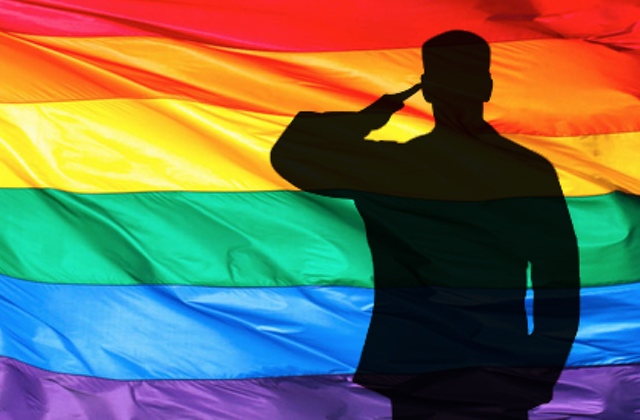
10 Years Since the Repeal of Don’t Ask: Don’t Tell

The leadership of PrideVA commemorate the 10th Anniversary of the Repeal of Don’t Ask: Don’t Tell at the Gravestone of Leonard Matlovich, a foundational leader of the effort to repeal the ban on LGBTQ+ citizens from serving i n the United States Armed Forces.
On February 28, 1994 the Clinton Administration enacted Directive 1304.26, titled “Don’t Act Don’t Tell” (DADT). This federal directive barred Lesbian, Gay, Bisexual and Transgender individuals from openly serving in the United States Armed Forces. The new Directive codified previous Department of Defense policies that outlawed homosexual conduct under the Uniform Code of Military Justice.
Under both acts, LGBT individuals would be discharged from military service for engaging in homosexual activity. DADT specifically prohibited any individuals from disclosing their LGBT status or discussing any same-sex relationship.
Don’t Ask: Don’t Tell was initially argued as an improvement over previous Department of Defense policies as it barred discrimination of closeted LGBT individuals, but prohibited individuals who “demonstrate a propensity or intent to engage in homosexual acts” from serving because their military service would “create an unacceptable risk to the high standards of morale, good order and discipline”.
Despite opinions that DADT was an improvement over the previous policy, it functionally had the same impact of discharging LGBT service members regardless of their military performance. In the years that the directive was enforced (1994-2010 in excess of 13,000 service members were discharged from the Armed Forces under the law. A large proportion not receiving “Honorable Discharge” solely based on their sexual orientation or gender identity.
In the early 2000s, growing legal resistance to DADT resulted in legal challenges to the directive. Growing public opinions in opposition to the Directive was shifting opinions in Congress regarding the law. In December 2010 legislation to repeal DADT was enacted, specifying that the act would remain in place UNTIL the President, Secretary of Defense, and the Chairman of the Joint Chiefs of Staff certified that the repeal of the Directive would not harm military operations.
On July 22, 2011 President Barrack Obama, Secretary of Defense Leon Panetta and Chairman of the Joint Chiefs of Staff Mike Mullen certified there would be no harm to military operations in repealing the Directive and set September 20, 2011 as the date of repeal.
On September 20, 2011, “Don’t Ask, Don’t Tell” was officially repealed, allowing LGBT service members to serve their country openly. In response to the repeal of DADT military and political leaders warned of dire consequences to military readiness including erosion of morale, the decline in recruiting because of openly serving LGBT members, and diminished military performance and readiness.
In the years following the repeal of DADT, the warnings of calamity have not come pass. Research conducted (1,2) demonstrated that in years following the repeal of DADT military readiness, morale, cohesion, and performance all improved. LGBTQ+ members serving openly actually improved readiness, morale, and recruiting!
In addition to the repeal positively impacting military performance it also positively impacted public opinions regarding LGBT individuals, their rights, and military service (3).
Since the repeal of DADT, the Veterans Administration has made significant advances in providing comprehensive services and care to “All Who Served”. VA Directives require LGBTQ+ veterans to now receive comprehensive care and services. In addition LGBTQ+ employees of the Veterans Administration are protected from discrimination, harassment, or exclusion.
PrideVA recognizes all the LGBTQ+ veterans who served under this discriminatory law and we thank you for your service. We celebrate the significant accomplishments, and societal change, that has resulted from the repeal of “Don’t Ask, Don’t Tell”. The consequences of the repeal of DADT are testament to the value, and positive impact, of eliminating discrimination whenever it occurs.
- Belkin, A., Ender, M. G., Frank, N., Furia, S. R., Lucas, G., Packard, G., … & Segal, D. R. (2013). Readiness and DADT repeal: Has the new policy of open service undermined the military?. Armed Forces & Society, 39(4), 587-601.
- Department of Defense: “Report of the Comprehensive Review of the Issues Associated with a Repeal of ‘Don’t Ask, Don’t Tell'” ArchivedJanuary 13, 2012, at the Wayback Machine, November 30, 2010. Retrieved January 30, 2012; comprehensive report. Survey results 63–79, analysis 120-6, quote 121: “Overall, in response to a variety of questions, 50–55% of the force indicated that repeal will have a mixed or no effect; about 15–20% believe that repeal will have a positive effect, while another 30% believe it will have a negative effect.”
- (3)Flores, A. (2014). National trends in public opinion on LGBT rights in the United States.